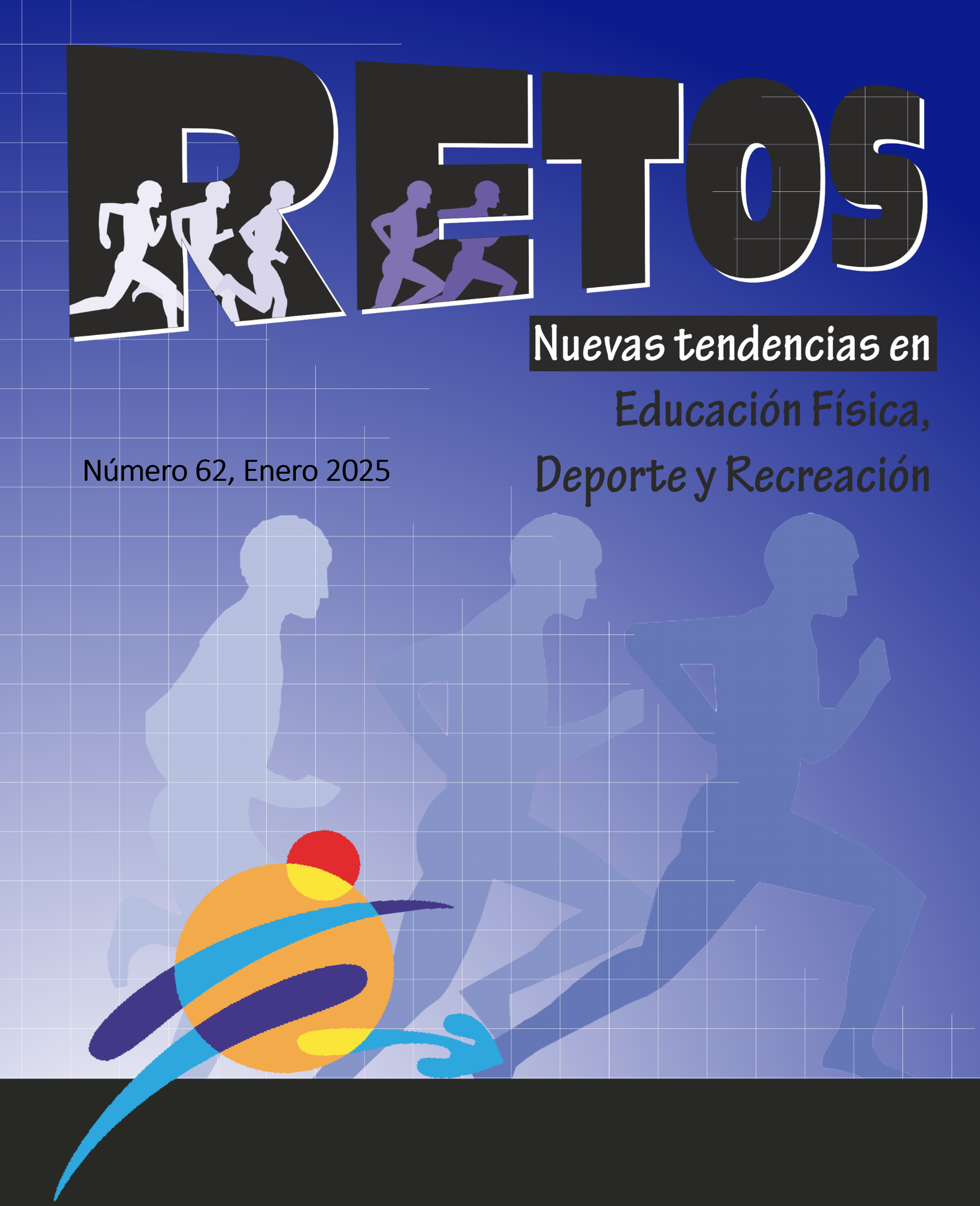Tradução e validação do Irrational Performance Beliefs Inventory (iPBI) numa exposição de deportistas mexicanos
DOI:
https://doi.org/10.47197/retos.v62.109888Palavras-chave:
TREC, crenças irracionais, deportistas, pensamentos, emoçõesResumo
Neste artigo são apresentados os resultados de uma investigação que validou o Inventário de Crenças de Desempenho Irracionais (iPBI) numa população de atletas mexicanos. O estudo é do tipo correlacional - causal no qual foi desenvolvida a tradução do iPBI do inglês para o espanhol, cujo qual foi validado por quatro especialistas no tema. Posteriormente, foi aplicada esta versão traduzida a uma lista de 315 atletas mexicanos. Os resultados indicam que a tradução foi validada satisfatoriamente pelos especialistas e através de uma Análise Fatorial Confirmatória comprovou-se que o modelo da versão original de 28 itens, embora inicialmente apresentasse uma carga fatorial não aceitável. Para obter um melhor ajuste do modelo, foram removidos 9 itens, resultando numa versão de 19 itens com um índice de ajuste comparativo (CFI) de 0,995 e um Alfa de Cronbach de 0,902, o que indica uma excelente consistência interna. Como conclusão, o processo de redução permitiu a validação da tradução e o ajuste do modelo original, logrando assim uma ferramenta adequada para medir as crenças irracionais dos deportistas mexicanos. Este estúdio apresenta uma versão validada do iPBI em espanhol que pode ser utilizada em investigações futuras e na prática desportiva, facilitando a identificação e gestão de crenças irracionais no ambiente desportivo do México.
Referências
Chrysidis, S., Turner, M., y Wood, A. (2020). The effects of REBT on irrational beliefs, self-determined motivation, and self-efficacy in American Football. Journal of Sports Sciences, 38(19), 2215-2224.
Chotpitayasunondh, V., y Turner, M. (2019). The development and validation of the Thai-translated irrational performance beliefs inventory (T-iPBI). Journal of Rational-Emotive y Cognitive-Behavior Therapy, 37, 202-221.
Dryden, W. (2022). Reason to Change: A Rational Emotive Behaviour Therapy Workbook 2nd Edition. Routledge.
Hair, J., Ringle C. y Sarstedt, M. (2011) PLS-SEM: Indeed a silver bullet. J. Market. Theory Pract. 19: 139-151
INEGI (2023). Módulo de Práctica Deportiva y Ejercicio Físico (MOPRADEF). Recuperado de: https://www.inegi.org.mx/contenidos/saladeprensa/boletines/2024/MOPRADEF/MOPRADEF2023.pdf
Kaiser, H. (1974) An index of factorial simplicity. Psychometrika 39: 31-36.
Levy J. y Varela, J. (2006) Modelización con Estructuras de Covarianza en Ciencias Sociales. Netbiblo. La Coruña, España. 517
Jordana, A., Ramis, Y., Chamorro, J., Pons, J., Borrueco, M., De Brandt, K., & Torregrossa, M. (2023). Ready for failure? Irrational beliefs, perfectionism and mental health in male soccer academy players. Journal of Rational-Emotive & Cognitive-Behavior Therapy, 41(2), 454-477.
Jordana, A., Turner, M. J., Ramis, Y., & Torregrossa, M. (2020). A systematic mapping review on the use of Rational Emo-tive Behavior Therapy (REBT) with athletes. International Review of Sport and Exercise Psychology, 16(1), 231-256.
Maxwell-Keys, C., Wood, A. G., y Turner, M. (2022). Developing decision making in Rugby Union match officials using rational emotive behavior therapy (REBT). Psychology of Sport and Exercise, 58, 102098
Michel-Kröhler, A., y Turner, M. (2022). Link between irrational beliefs and important markers of mental health in a Ger-man sample of athletes: Differences between gender, sport-type, and performance level. Frontiers in psychology, 13, 918329.
Miller, A., Calder, B., Turner, M., y Wood, A. (2023). Exploring the association between irrational beliefs, motivation regulation and anxiety in ultra-marathon runners: a mixed methods approach. Journal of Rational-Emotive y Cognitive-Behavior Therapy, 41(2), 392-410.
Muñiz, J., Elosua, P. y Hambleton, R. (2013). Directrices para la traducción y adaptación de los tests: segunda edición. Psico-thema, 25(2), 151-157.
Nejati, M., Farsi, A., Moteshareie, E., y Turner, M. (2022). The persian irrational performance beliefs inventory (iPBI-Persian): Translation, confirmatory factor analysis, and test–retest reliability, in iranian athletes. Journal of Rational-emotive y Cognitive-behavior Therapy, 40(2), 191-205.
Turner, M., y Allen, M. (2018). Confirmatory factor analysis of the irrational Performance Beliefs Inventory (iPBI) in a sample of amateur and semi-professional athletes. Psychology of Sport and Exercise, 35, 126-130–130.
Turner, M., Allen, M. S., Slater, M., Barker, J., Woodcock, C., Harwood, C. y McFadyen, K. (2018). The development and initial validation of the irrational performance beliefs inventory (iPBI). European Journal of Psychological Assessment, 34, 174-180.
Turner, M., Goldman, S., & Terjesen, M. (2023). Introduction to the special issue on the application of rational emotive behavior theory and practice to high-performance settings. Journal of Rational - Emotive & Cognitive - Behavior Therapy, 41(2), 247-250.
Turner, M., y Barker, J. (2013). Examining the efficacy of rational-emotive behavior therapy (REBT) on irrational beliefs and anxiety in elite youth cricketers. Journal of Applied Sport Psychology, 25(1), 131-147.
Turner. M. y Barker, J. (2014). Using Rational Emotive Behavior Therapy with athletes. The Sport Psychologist. 28, 75-90.
Downloads
Publicado
Como Citar
Edição
Secção
Licença
Direitos de Autor (c) 2024 Alvaro Eduardo Alarcon-Padilla, Francisco Javier Mendoza Farías, Carlos Federico Miranda Medina, José Luis Cantú-Mata, Daniel Gómez Gibal

Este trabalho encontra-se publicado com a Licença Internacional Creative Commons Atribuição-NãoComercial-SemDerivações 4.0.
Autores que publicam nesta revista concordam com os seguintes termos:
- Autores mantém os direitos autorais e assegurar a revista o direito de ser a primeira publicação da obra como licenciado sob a Licença Creative Commons Attribution que permite que outros para compartilhar o trabalho com o crédito de autoria do trabalho e publicação inicial nesta revista.
- Os autores podem estabelecer acordos adicionais separados para a distribuição não-exclusiva da versão do trabalho publicado na revista (por exemplo, a um repositório institucional, ou publicá-lo em um livro), com reconhecimento de autoria e publicação inicial nesta revista.
- É permitido e os autores são incentivados a divulgar o seu trabalho por via electrónica (por exemplo, em repositórios institucionais ou no seu próprio site), antes e durante o processo de envio, pois pode gerar alterações produtivas, bem como a uma intimação mais Cedo e mais do trabalho publicado (Veja O Efeito do Acesso Livre) (em Inglês).
Esta revista é a "política de acesso aberto" de Boai (1), apoiando os direitos dos usuários de "ler, baixar, copiar, distribuir, imprimir, pesquisar, ou link para os textos completos dos artigos". (1) http://legacy.earlham.edu/~peters/fos/boaifaq.htm#openaccess


